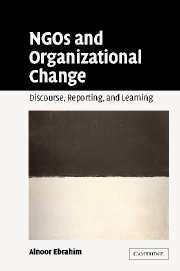Book contents
- Frontmatter
- Contents
- List of figures
- List of tables
- Acknowledgments
- List of abbreviations
- Introduction
- 1 The making of NGOs: the relevance of Foucault and Bourdieu
- 2 The NGOs and their global networks
- 3 NGO behavior and development discourse
- 4 Interdependence and power: tensions over money and reputation
- 5 Information struggles: the role of information in the reproduction of NGO-funder relationships
- 6 Learning in NGOs
- 7 Challenges ahead: NGO-funder relations in a global future
- Notes
- References
- Index
6 - Learning in NGOs
Published online by Cambridge University Press: 22 September 2009
- Frontmatter
- Contents
- List of figures
- List of tables
- Acknowledgments
- List of abbreviations
- Introduction
- 1 The making of NGOs: the relevance of Foucault and Bourdieu
- 2 The NGOs and their global networks
- 3 NGO behavior and development discourse
- 4 Interdependence and power: tensions over money and reputation
- 5 Information struggles: the role of information in the reproduction of NGO-funder relationships
- 6 Learning in NGOs
- 7 Challenges ahead: NGO-funder relations in a global future
- Notes
- References
- Index
Summary
This chapter examines organizational learning as a key process of change in NGOs. It shows that change through learning – even in very innovative NGOs – can be slow and constrained by a number of factors. For practitioners, policymakers, and scholars who work with NGOs (and possibly try to facilitate change in them), it is important to recognize how learning occurs and what its limitations may be. The theoretical portion of this chapter draws heavily from the sociological literature on organizational behavior, and it may thus be of interest not only to those who work with NGOs, but also to those who work with organizations in the public and private sectors. In addition, this chapter may be useful to educators as it provides case studies for teaching how NGOs and funders learn. I draw primarily from the work of three organizational learning theorists: James March, Chris Argyris, and Donald Schön.
In investigating processes of organizational learning, my primary question is simply: How do NGOs learn? Beginning with a typology of learning, I then develop general model of organizational learning. Those readers less interested in the theoretical material may wish to skip the sections entitled “A Basic Learning Cycle” and “A Stimulus-Response Model of Learning.” Using the typology and model, I then examine learning processes in the case NGOs. I show not only how learning processes have led to behavioral change in these organizations, but how learning has been constrained.
- Type
- Chapter
- Information
- NGOs and Organizational ChangeDiscourse, Reporting, and Learning, pp. 107 - 150Publisher: Cambridge University PressPrint publication year: 2003

